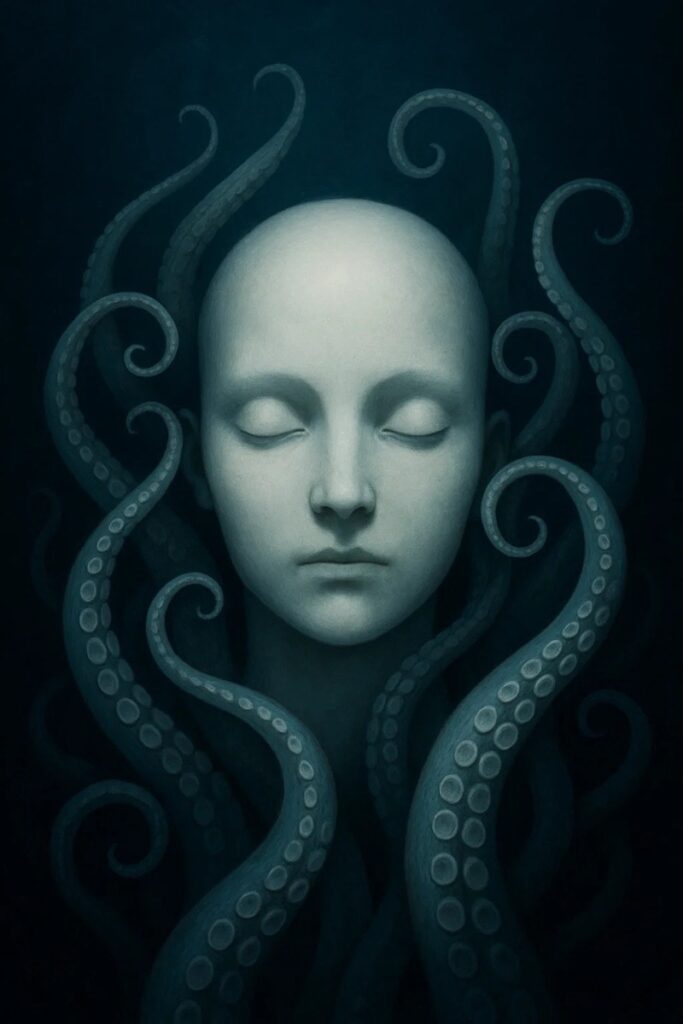He doesn’t leave the house.
It’s not agoraphobia. He likes the outside. He misses the smell of cut grass, the burn of sunlight behind his eyes. But there’s a sacredness to his solitude. A bitter sanctum. If he leaves, people might ask how he’s doing.
He doesn’t want to lie.
He really doesn’t want to tell the truth.
So he stays. Inside. Dim light, stale air, dust in corners he no longer bothers sweeping. The fridge is half-empty, the sink half-full. He orders everything in, even food he doesn’t eat. Half the bags rot on the counter.
The smell of its ruin is comforting, somehow.
The attempt was months ago. Maybe more. Time doesn’t flow in here—it curdles.
He never meant to make a show of it. No livestream, no call for help. Just silence and intention. No note, for there was no-one he wanted to say goodbye to. Not any more.
He woke up vomiting, alone, angry he’d failed. Again.
That’s when they arrived.
Not that night. Not dramatically. Sometime after. They never came in, exactly. They just… started to be there. Their presence something like humidity. A soft shift in pressure. A low murmur under his thoughts.
He found the razor blades gone first.
Then the kitchen knives, one by one.
Then the pills.
He thought he was losing his mind. He wanted to be losing his mind. At least then he could name the enemy.
They made him tea, set it gently by the bed.
A warm mug, with a clean handle, and a soft floral taste. No note. No confrontation. Just quiet, unbearable care.
He tried to set a trap.
Laid out broken glass and kitchen twine. Left the oven door ajar. Hid a screwdriver in the vent and dared them to move it.
They did.
Without sound. Without asking.
Each time, he found the danger gone, and something kind in its place. A candle lit on the windowsill. A clean shirt folded and warm. Once, a note: “Eat something, please.” No signature. Just the curl of wet ink.
He started sleeping more.
Hating every minute of it.
The grief was supposed to keep him company. A houseguest he could always rely on. It kept him tethered to himself, a constant reminder of what he’d lost, who he was, why he deserved this sham of a life.
The tentacles don’t care.
They take the mold off the shower curtain. They wash the grease from the pan he left sitting for two weeks. They hum softly through the floorboards when he has a panic attack, as if tuning his breathing to their rhythm.
He lashes out.
Punches a hole in the wall. Screams into a pillow. Carves “I WANT TO STAY SAD” into a paper plate with a fork.
The next morning, the fork is gone. The hole is patched. The plate is pinned to the fridge with a magnet that reads: “That’s okay.”
He tries to leave the front door open. Just to see.
He wakes up, and it’s closed. Locked. Warmth radiating from it like it had been touched lovingly before being shut.
He starts keeping a diary.
Not because he’s healing. But because he wants to remember the hurt. The pain. He doesn’t want it to fade like a bad dream.
They leave it untouched.
But one day, the pen’s been refilled.
He starts to feel… better.
He hates that, too.
Some days he walks outside. Not far. Just to the mailbox. They don’t stop him. They don’t guide him. But when he stumbles, there’s always something to catch him. A branch. A breeze. A shadow that moves just in time.
He talks to them now.
Out loud, sometimes.
He says, “I didn’t ask for this. I don’t want it.”
“You don’t need to,” he says.
Sometimes, in reply, the teacup rattles. Or the fan turns without being on. Or he feels the soft, cool touch of something sliding beneath the surface of his thoughts.
One night, drunk on exhaustion and reluctant comfort, he whispers, “Thank you.”
They don’t respond.
But in the morning, the bed is made.
The mug he’s never seen before says: You’re welcome.
